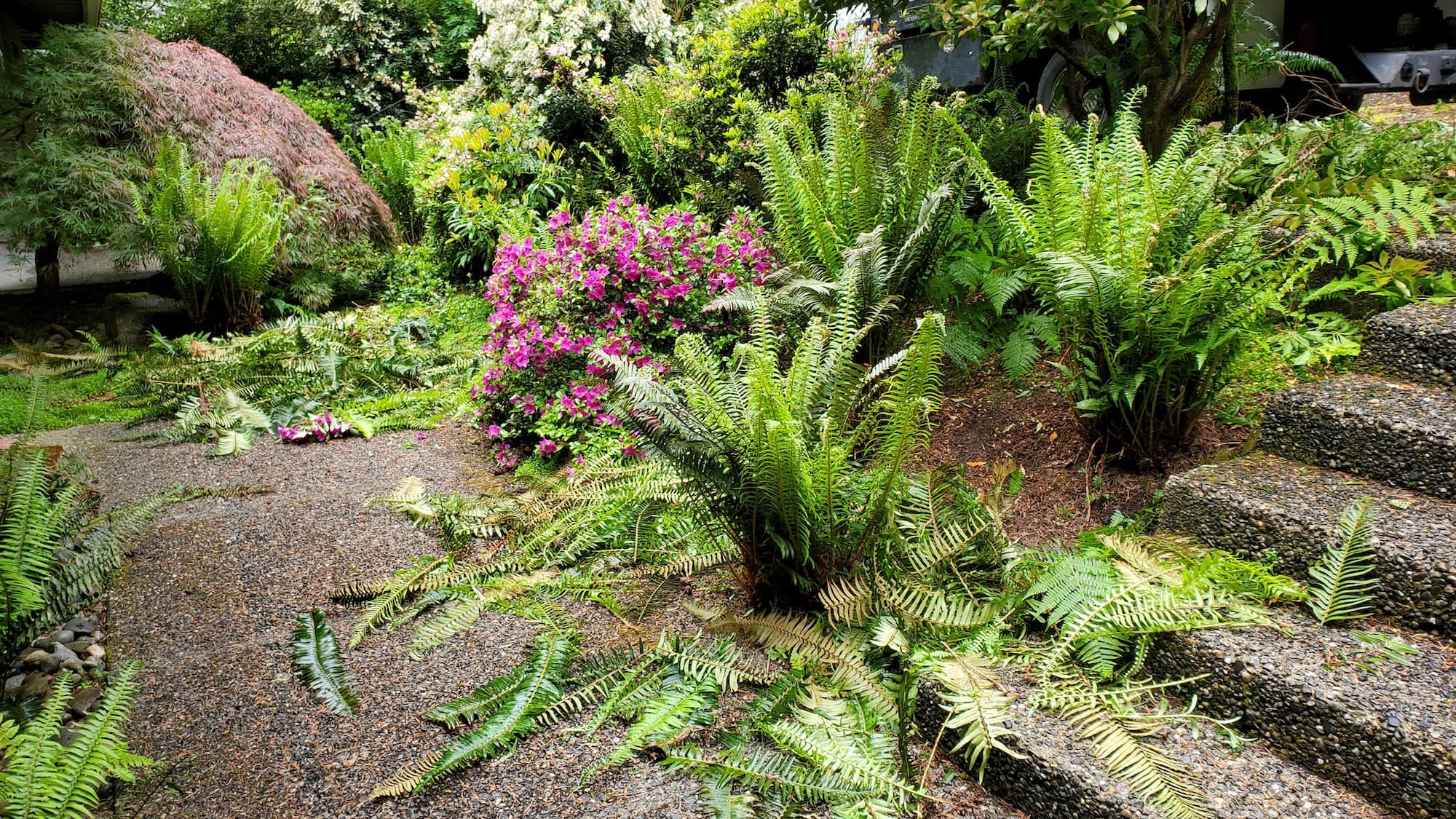West Seattle Raised Garden Beds
Homeowner’s Issue
West Seattle yards deal with a familiar set of headaches: compacted glacial soils, heavy winter rain, shady slopes, and relentless weeds where lawn meets native forest. Many homes around Alki, Admiral, and the hillier pockets near Lincoln Park have thin topsoil over clay or glacial till, so plants struggle in summer droughts and get waterlogged in winter. Moss is common under cedars and in north-facing corners, while ivy and bindweed creep down property edges from neighboring green belts.
Sun exposure varies block to block—south-facing spots on the upper bluff get full sun, while lots tucked below trees get polite dappled light. Drainage troubles show up as puddles in low spots and soggy beds that rot roots; conversely, raised patios and retaining walls can leave beds bone-dry in late July. HOA sightlines and curb appeal matter in some West Seattle neighborhoods, so installations need to be tidy and low-profile where required.
If you’re tired of hauling compost every spring, or your vegetable patch is a mud-pie two months of the year, we design raised beds that address West Seattle’s soil, shade, and drainage quirks with sustainable, low-effort solutions that last.
Our Quality Service
We build durable, sustainably sourced raised beds sized to your space and sun pattern. We use untreated cedar or rot-resistant composite, stainless fasteners, and simple tongue-and-groove construction so beds stay square and don’t leach chemicals into soil. Tools are hand and power saws, battery drills, wheelbarrows, and small excavators for larger projects.
Work typically takes one day for a couple of 4x8 beds or 1–2 days for larger layouts. We prepare subgrade, install a gravel layer where needed for drainage, line with breathable landscape fabric if requested, and fill with a custom soil mix of screened topsoil, compost, and pumice for structure and drainage. We do drip irrigation installs as an add-on and always recommend mulch to cut watering and weed pressure.
We follow seasonal logic: build in spring or fall for best soil settling, avoid heavy rains where access is muddy, and respect Seattle water-wise guidelines—no chemical herbicides, only organic, manual, and mechanical weed control.
Benefits: safer gardening height, fewer weeds, improved drainage, better water retention in summer, and a tidy look that plays well with West Seattle curblines.
What’s Included
- Site visit and sun/drainage assessment
- Design and placement recommendations (sun maps for edibles)
- Supply and install of raised bed frames (sizes per quote)
- Soil mix tailored for West Seattle (screened topsoil + compost + pumice)
- Optional planting of veggies, herbs, or pollinator flowers
- Clean-up and haul-away of debris
Options / Upgrades:
- Mulch + breathable landscape fabric (reduces weeds, allows water)
- Organic weed control and hand-weeding follow-up (no herbicides)
- Drip irrigation installation, timers, and winterization
- Haul-away vs. city green bin disposal for old soil/yard waste
- Built-in seating/trellis or accessible-height beds for seniors
Before & After / Expectations
Expect some noise and dirt during build day—saws, drills, and wheelbarrows—but we leave the site tidy and wheelbarrow out most debris. Larger projects may require a short staging area in driveway; narrow alleys could extend timeline by a day. Most standard installs finish in one business day; complex terraces or retaining work can take 2–3 days.
Aftercare: mulch beds immediately and water-in new plantings. In West Seattle, early fall or late spring builds settle best. Watch for summer drought weeks in July–August; drip systems and mulch cut watering needs. Ivy and bindweed are seasonal: pull in spring before seed set, and maintain a 4–6 week hand-pull rotation. Moss indicates shade and poor drainage—add grit and increase airflow or relocate beds to sunnier spots if growing sun-loving crops.
FAQs
Q: When’s the best time to install?
A: Early spring or fall—soil settles well and plants establish before dry or wet extremes.Q: Do you use herbicides?
A: No. We use organic soil, manual removal, mulching, and mechanical control only.Q: How long before I can plant?
A: You can plant immediately if we use a finished soil mix; seedlings take to new beds within days.Q: Will raised beds help drainage on slopes?
A: Yes—stem-wall or terraced beds with gravel sock drainage solve many slope issues, but steep sites may need retaining measures.Q: What about HOA rules and sightlines?
A: We design to be low-profile and can submit simple sketches if your HOA asks.
Call to Action
If your West Seattle yard needs smarter soil and easier gardening, we can help. We book quick estimates, work clean, and use sustainable methods that suit Alki, Admiral, and Lincoln Park properties. Email neatandtidyseattle@gmail.com for a free photo estimate or to schedule an on-site visit. Friendly, local, and practical—let’s make your garden work with the neighborhood, not against it.










